上海版 牛津英语 6B Unit 2
上海版 牛津英语 6B Unit 2

Unit 2 At the airportII. Choose the best answer (选择最恰当的答案): (共15分)( ) 1. New York is one of the biggest cities in _______ U.S.A.A. aB. anC. theD. /( ) 2. Please help _______ with my heavy bags, Danny.A. usB. meC. youD. them( ) 3. The Zhangs have done a lot of things but not _______.A. everythingB. somethingC. anythingD. nothing( ) 4. The ship will leave _______ Guangzhou _______ 7 o’clock this evening.A. /, inB. at, inC. to, atD. for, at( ) 5. Have you got _________ in your suitcase?A. enough spaceB. space enoughC. spaces enoughD. enough spaces( ) 6. I’ve never _______ to other countries before.A. goneB. leftC. beenD. visited( ) 7. I’m going to see my cousins off at the airport _______ Friday afternoon.A. inB. onC. atD. by( ) 8. –Where is Jenny?–She _______ the library.A. has been toB. has gone toC. wentD. goes( ) 9. Have you _______ Aunt Kite’s telephone number yet?A. writeB. write downC. writtenD. written down ( ) 10. Paul is badly ill now, so he _______ stay in hospital for several days.A. needsB. has toC. canD. have( ) 11. Ben _______ stay in Beijing for one year.A. planB. planning toC. plansD. plans to( ) 12. I can’t find my English book. Someone has _______ it away by mistake.A. leftB. takenC. goneD. bought( ) 13. I bought some stamps _______ him. So he gave some money _______ me.A. to, toB. to, forC. for, toD. for, for( ) 14. She would like to buy several T- shirts. The underlined means _______.A. a fewB. a littleC. manyD. much( ) 15. –Let me drive you to the supermarket.–_______A. You’re welcome.B. Never mind.C. You are great.D. Thank you.III. Complete the sentences with the given words in their proper forms(用括号中所给单词的适当形式完成下列句子): (共7分)1. Please get to the airport two hours before the_______ time. (depart)2. Mrs. Li is going to get her _______ card. (board)3. _______ are not allowed to smoke on the plane. (pass)4. They got two _______ and went into the supermarket. (trolley)5. You attention, please. The train from Hangzhou has just ________. (arrival)6. The ________ Number is CA929. (fly)7. Don’t worry. Let me ________ you to the cinema. (driver )IV. Rewrite the following sentences as required(根据所给要求,改写下列句子。
上海牛津英语6B Unit 2 At the airport Page 10-11

PAGE 10 KEY POINTS:
• 3. What does each sign mean? = What’s the meaning of each sign? • What does…mean? = What is the meaning of …? …是什么意思? • mean (meant, meant) v. meaning n. • meaningful adj. 有意义的 • meaningless adj. 无意义的
UNIT 2
AT THE AIRPORT
SHARON
PAGE 10:
• 看见很多标志
see a lot of signs
• 那边的一些手推车
some trolleys over there
• 我们在哪里能找到一辆手推车? Where can we find a trolley?
• 每个标志的含义是什么?
PAGE 10 KEY POINTS:
PAGE 11 KEY POINTS:
• 1. a passport 一张护照 • 2. a boarding card 一张登机牌 • board n. 板 boarding n. 登机 • go aboard 登机、登船 • go abroad 飘洋过海出国去
---_________.
A. That’s right. 那是对的。
B. You are all right. all right=safe and well 安全健康的
C. That’s all right.
D. All right.
(1)没关系。(道歉的回答) (2)不客气。(道谢的回答)
好的。
What does each sign mean?
牛津小学英语6BUnit2教案

牛津小学英语6BUnit2教案The first period教学要求:1、能听懂、会说、会读、会写单词low,slow.2、能听懂、会说、会读单词lower,high,higher,slower,fast,faster,3、能听懂、会说、会读、会写句子 Does Jim swim slowerthan David? No,he doesn't.He swims faster than David.教学重点:1、听得懂、会说、会读、会拼写单词 low,slow.2、听得懂、会说、会读、会写句子 Does Jim swimslower than david? No, he doesn't.He swims faster than David.教学难点:熟练掌握和正确运用四会单词和句型。
课前准备:将B部分分散的图绘制成一幅学生在进行各种活动的图。
布置学生调查填写表格(如下)Step1: Greeting1. sing a song "I wish I was taller"2.T:Let’s do some exercise .Follow me :Run,run,run fast. Swim,swim,swim fast.Jump,jump,jump high. Fly,fly,fly a kite. Fly,fly ,fly a model plane.1. T:(出示图)Look,the students are having a school festival today. They are all very happy.Let’s go and have a look. whatare they doing?S1:SuHai and SuYang are flying kites.S2:Ben and David are flying model planes.S3:The boys are running.2. T:Look,Mike runs fast.Teach:fast 快的,快地T:Does WangBing run fast,too?S:Yes,he does.T:WangBing runs fast.But Mike runs faster than WangBing. Teach:fsater 更快的,更快地Teach:Mike runs faster than WangBing.(板书) T: Plase look at the picture. Who runs faster than David?S: Jim runs faster than David.WangBing runs faster than David.Mike runs faster than David.Can you say: sb.runs faster than sb.S:Yes ,we can. Mike runs faster than Jim.S: WangBing runs faster than Jim.操练句型:Sb. runs faster than Sb.(根据调查表)3.Teach:Does xxx run faster than xxx?T:Does A run fast?S:Yes,he does.T:Does B run faster than A?S:Yes,he does./No,he doesn’t.T:Does C run faster than A?S:Yes,she does./No,she doesn’t.操练句型:Does xxx run faster than xxx?Yes,he/she does./No,he/she doesn’t.4.Teach:low,lowerT:Now ,the boys are swimming. Does Jim swim fast?S:Yes,he does.T:Does David swim faster than Jim? ?S:No,he doesn’t.T:Yes.Jim swims low.He swims lower than Mike.Teach:low (慢的,慢地) lower (更慢地)T:Does Jim swim slower than David?S:No,he doesn’t.He swims faster than David.板书这两句话。
上海牛津版英语六年级下册6BUnit2U2同步讲义

学员编号:年级:六年级课时数:学员姓名:辅导科目:英语学科教师:授课类型T 6B U2同步梳理星级★★★教学目标1、掌握同步的知识点,包括单词\句型2、能够正确根据所学知识,掌握做同类题型的方法。
(建议2-5分钟)批注:让学生根据上面图片中的旅游景点,用英语讨论旅游相关的事情,如准备事项,旅游时的注意事项。
T同步-U2基础知识梳理1(建议20-25分钟)一、词汇Words1. airport n.机场e. g.-Our father is coming to Shanghai by air.我们的父亲要乘飞机来上海。
-I'll meet him at the airport.我会去机场接他。
批注:airport 是由air和port 组成,可以用组合法教学生记忆这个单词的方法。
2. before adv.以前e. g.-Have you been to Shanghai before? 你以前去过上海吗?-No, this is my first time.没有,这是第一次。
【知识拓展】before prep. 在……前面e. g. In the alphabet, A is before all the other letters.在字母表中,A排在所有字母3. several adj.几个;一些e. g. There are several apples on the table.桌子上有几个苹果。
-You seem to know each other well.你们好像很熟。
-Yes. We've met several times.是的,我们见过几次了。
4. however adv.然而;不过;仍然e. g. She felt ill, however, she went to work.她病了,然而她照旧去上班。
Later, however, he decided to go.后来,他仍然决定去了。
上海牛津英语六年级第二学期6B英语知识点汇总U1-U9

六年级第二学期牛津英语知识点梳理Unit One Great cities in Asia打*的知识点仅供参考知识点梳理:I 词组1. at an exhibition 在展览会上2. the capital of China 中国的首都3. north-east of Shanghai 在上海东北面east/ west/ south / north of 在……的东、西、南、北面north-east /north-west of 在……的东北、西北south-east /south- west of 在……东南,西南* in/on/to the east ofeg. Shanghai is in the east of China.Korea is on the east of China.Japan is to the east of China.3. how far 多远4. how 如何/怎样5. how long 多久6. in the past 在过去7. other places 其他城市8. from shanghai to Beijing 从上海到北京9. read some information about Beijing 阅读关于北京的信息10. the Great Wall 长城* the Summer Palace 颐和园* the Palace Museum 故宫博物院11. more than= over 超过* less than = under 少于12. 15 million people 一千五百万人*millions of, thousands of13. huge department store 大型百货公司*huge= very big14. spicy food 辣的食物15. in Asia 在亚洲16. great cities= big cities 大城市17. which city 哪个城市18. by plane=by air; 乘飞机by ship=by sea; 乘船by train/ ferry 乘火车/ 渡轮19. That’s right. 对的。
牛津6b Unit 2
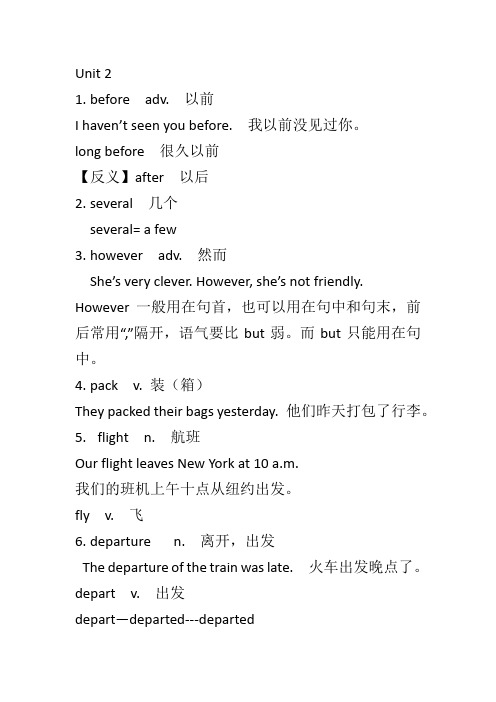
Unit 21.before adv. 以前I haven’t seen you before.我以前没见过你。
long before 很久以前【反义】after 以后2.several 几个several= a few3.however adv. 然而She’s very clever. However, she’s not friendly. However一般用在句首,也可以用在句中和句末,前后常用“,”隔开,语气要比but弱。
而but只能用在句中。
4.pack v. 装(箱)They packed their bags yesterday. 他们昨天打包了行李。
5.flight n. 航班Our flight leaves New York at 10 a.m.我们的班机上午十点从纽约出发。
fly v. 飞6.departure n. 离开,出发The departure of the train was late. 火车出发晚点了。
depart v. 出发depart—departed---departed7.have to modal.v 不得不I have to go now. 我不得不走了。
【否定】don’t have to 不需要I don’t have to go now. 我不需要现在走。
have to 在一般现在时中,意思和must相近,所以在过去时和将来时中经常用have to代替must。
8.worry v. 担心Don’t worry about me. 不用担心我worried adj. 担忧的,担心的9.bring v. 带来,把……带到某处【反义】take v. 带走。
牛津上海英语6BUnit 2基础练习(解析版)
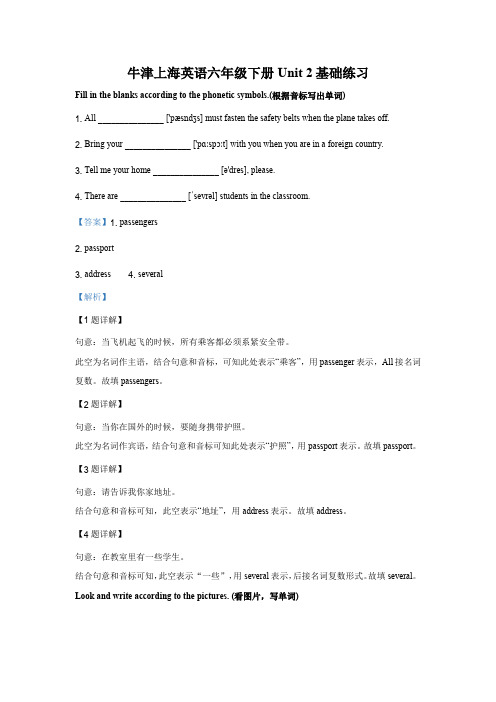
牛津上海英语六年级下册Unit 2基础练习Fill in the blanks according to the phonetic symbols.(根据音标写出单词)1. All _______________['pæsndʒs] must fasten the safety belts when the plane takes off.2. Bring your _______________['pɑːspɔːt] with you when you are in a foreign country.3. Tell me your home _______________[ə'dres], please.4. There are _______________[ˈsevrəl] students in the classroom.【答案】1. passengers2. passport3. address4. several【解析】【1题详解】句意:当飞机起飞的时候,所有乘客都必须系紧安全带。
此空为名词作主语,结合句意和音标,可知此处表示“乘客”,用passenger表示,All接名词复数。
故填passengers。
【2题详解】句意:当你在国外的时候,要随身携带护照。
此空为名词作宾语,结合句意和音标可知此处表示“护照”,用passport表示。
故填passport。
【3题详解】句意:请告诉我你家地址。
结合句意和音标可知,此空表示“地址”,用address表示。
故填address。
【4题详解】句意:在教室里有一些学生。
结合句意和音标可知,此空表示“一些”,用several表示,后接名词复数形式。
故填several。
Look and write according to the pictures. (看图片,写单词)5. What a beautiful silk _______________ it is!6. Please get a _______________ before we enter the supermarket.7. I have got enough _______________ in my suitcase for my clothes.8. This sign means that there is an _______________.9. Please put a name _______________ on you luggage.【答案】5. scarf6. trolley7. space8. elevator9. tag【解析】【5题详解】句意:多么漂亮的一条丝绸围巾啊!此句为感叹句,句型为“What+a/an+adj+可数名词单数+主语+谓语!”,此空为名词。
上海版牛津英语6B第二单元复习笔记RevisionU2
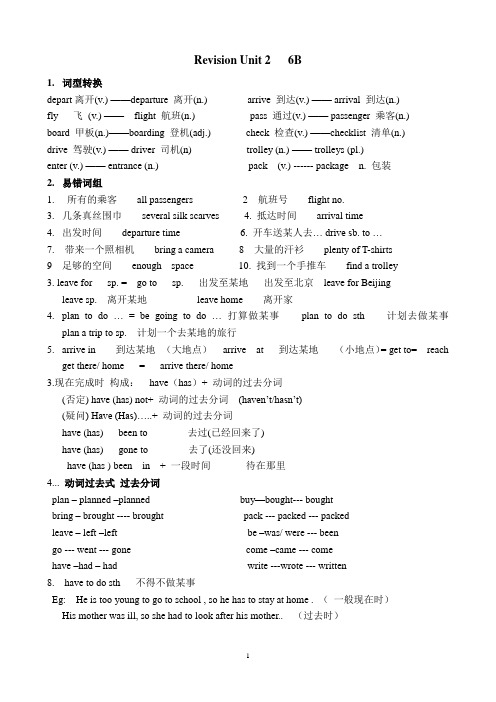
Revision Unit 2 6B1.词型转换depart离开(v.) ——departure 离开(n.) arrive 到达(v.) —— arrival 到达(n.)fly 飞(v.) ——flight 航班(n.) pass 通过(v.) —— passenger 乘客(n.)board 甲板(n.)——boarding 登机(adj.) check 检查(v.) ——checklist 清单(n.)drive 驾驶(v.) —— driver 司机(n) trolley (n.) —— trolleys (pl.)enter (v.) —— entrance (n.) pack (v.) ------ package n. 包装2.易错词组1.所有的乘客all passengers 2 航班号flight no.3.几条真丝围巾several silk scarves4. 抵达时间arrival time4.出发时间departure time 6. 开车送某人去… drive sb. to …7. 带来一个照相机bring a camera 8 大量的汗衫plenty of T-shirts9 足够的空间enough space 10. 找到一个手推车find a trolley3. leave for sp. = go to sp. 出发至某地出发至北京leave for Beijingleave sp. 离开某地leave home 离开家4.plan to do … = be going to do … 打算做某事plan to do sth 计划去做某事plan a trip to sp. 计划一个去某地的旅行5.arrive in 到达某地(大地点)arrive at 到达某地(小地点)= get to= reachget there/ home = arrive there/ home3.现在完成时构成:have(has)+ 动词的过去分词(否定) have (has) not+ 动词的过去分词(haven’t/hasn’t)(疑问) Have (Has)…..+ 动词的过去分词have (has) been to 去过(已经回来了)have (has) gone to 去了(还没回来)have (has ) been in + 一段时间待在那里4...动词过去式过去分词plan – planned –planned buy—bought--- boughtbring – brought ---- brought pack --- packed --- packedleave – left –left be –was/ were --- beengo --- went --- gone come –came --- comehave –had – had write ---wrote --- written8. have to do sth 不得不做某事Eg: He is too young to go to school , so he has to stay at home . (一般现在时)His mother was ill, so she had to look after his mother.. (过去时)Revision Unit 2 6BClass: _____ Name: _______ Score: _________ 1.词型转换depart离开(v.) ---_________离开(n.) arrive 到达(v.) ——-_________ 到达(n.)fly 飞(v.) ——-_________航班(n.) pass 通过(v.) ——-_________乘客(n.)board 甲板(n.)——-_________登机(adj.) check 检查(v.) ——-_________ 清单(n.)drive 驾驶(v.) —-_________ 司机(n) trolley (n.) ——-_________ (pl.)enter (v.) ——-_________ (n.) pack (v.) ------_________ n. 包装2.易错词组1 所有的乘客-_____________2 航班号-_________no.3几条真丝围巾-_________________ 4. 抵达时间-_________ time3.出发时间-_________time 7. 开车送某人去…-_________sb. _________8带来一个照相机-________________ 9. 大量的汗衫______________10 足够的空间-_________ 11 找到一个手推车-_____________12-_________ sp. = -_________ sp. 出发至某地-_____________离开某地-______________ 离开家13.plan to do … = -_________… 打算做某事-______________ 计划去做某事-_________________ 计划一个去某地的旅14-_________ 到达某地(大地点)-_________ 到达某地(小地点)= -_________= -_________ get there/ = -_________15.现在完成时构成:have(has)+ 动词的过去分词(否定) have (has) not+ 动词的过去分词(haven’t/hasn’t)(疑问) Have (Has)…..+ 动词的过去分词-_________ 去过(已经回来了)-_________ 去了(还没回来)-_________ + 一段时间待在那里16..动词过去式过去分词plan –-_________ –planned buy—-_________----_________bring –-_________ ---- -_________ pack --- -_________ --- -_________leave –-_________–-_________ be –-_________ --- -_________go ---_________ --_________ come –_________--_________have –_________ –_________ write ---_________--- _________17.. have to do sth 不得不做某事Eg: He is too young to go to school , so he ______ _______ stay at home . (一般现在时)His mother was ill, so she _________ _________ look after his mother.. (过去时)。
牛津小学英语_6B_Unit2(CDE)
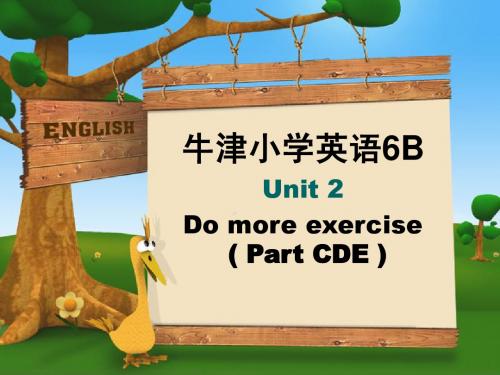
Listen and answer Q1:Who is late for school? Jim is late for school . be late for school
上学迟到
Q2:Who will read the new words ? Helen .
Read and judge
early earlier
Yao Ming is good at playing basketball. (善于,擅长…)
play play weபைடு நூலகம்l
play better
They are good at jumping.
(善于,擅长…)
jump jump far
jump farther
far 远的, (比较级 farther)
what about = how about +动名词
……怎么样
例: What about going for a walk around the lake ?
have a lot of fun
有很多的乐趣
all of us 我们所有人 have an English lesson上一堂英语课 be late for school 上学迟到 do well in 做得好 do better in 做得更好 need help with 需要帮助 after school 放学后 do more exercise 做更多的锻炼 Would you … , please? 请你…… ,好吗?
1.8m
2.4m 12’’
1.5m
1.9m 14’’
Skate
A: Do the boys jump higher than the girls? B: Yes , they do . / No , they don’t .
沪教版六年级英语下册(上海牛津6B)知识点总结
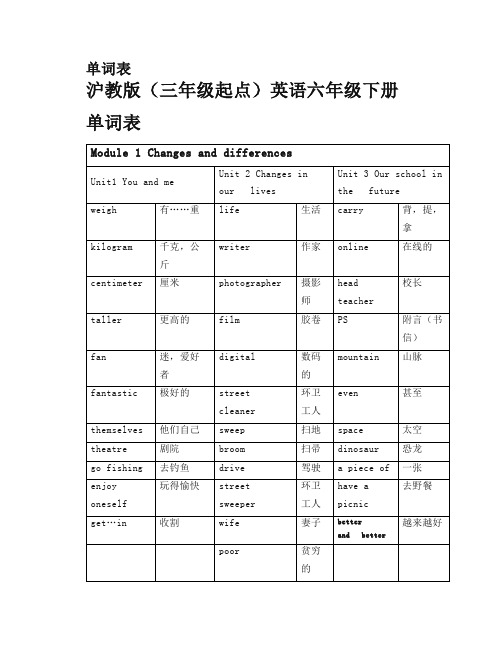
lazy
懒惰的
take off
脱掉
roof
屋顶
yard
院子
hit
碰撞
see the world
见世面
one by one
一个接一个地
look out of
往外看
even
甚至
themselves
他们自己
sweep
扫地
space
太空
theatre
剧院
broom
扫帚
dinosaur
恐龙
go fishing
去钓鱼
drive
驾驶
a piece of
一张
enjoy oneself
玩得愉快
street sweeper
环卫工人
have a picnic
去野餐
get…in
收割
油
craft
手艺,工艺
long race
长跑
oil painting
油画
crown
王冠
short race
短跑
powerful
强有力的
scissors
剪刀
win
获胜
ink
墨水
tape
胶带
long jump
跳远
brush
画笔,刷子
glue
胶水
high jump
跳高
paints
绘画颜料
saw
锯
swimsuit
kilogram
千克,公斤
writer
作家
online
在线的
centimeter
厘米
photographer
上海牛津英语六年级下册模块2重点总结

上海牛津英语6B模块2重点总结Module 2 Changes改变Unit 1 What will I be like?我将是什么样子?Ask and answer问一问,答一答S1:What will Peter/Jill be like in 15 year s’time?在15年时间之后,彼得/吉尔将是什么样子?S2: He/She will be …他/她将是……。
He/She will be … tall. 他/她将高……。
He/She will weigh … kilograms. 他/她将重……公斤。
S1: What will he /she possibly be in 15 year s’time?在15年时间之后他/她将成为什么?S2: He/She will possibly be a/an …他/她将也许成为一个……。
S1: Yes,I agree./ No,I don’t agree. He/She will possibly be a/an …是的,我同意。
/不,我不同意。
他/她将也许成为一个……。
About you关于你What would you like to be? Write a report.你想要成为什么?写一篇报告。
拓展:一般将来时一般将来时表示将要发生的动作或存在的状态,其构成形式为助动词will+动词原形。
如:I will visit Beijing next year.明年我将去参观北京。
She will not come here. 她将不会来这儿。
——Will you play football with him? 你将和他一起踢足球吗?——Yes, I will.是的,我会。
——No, I won’t. 不,我不。
拓展:奥林匹克格言(motto)的由来“更高、更快、更强(Faster, higher, stronger),是鼓励运动员(athlete)要继续不断地参加运动,努力追求进步与追求自我突破。
上海牛津英语-6B-Unit-2-At-the-airport-Exercise-One

Unit 2 At the airportExercise oneI.Fill in the blanks with the proper words. (选词填空)1.My parents are planning ___________ to Tokyo this summer. (going, togo)2.She will buy some silk ____________ as presents for her friends.(scarf/scarves)3.Have you got ______________ for everyone at the party? (enoughapples/apples enough)4.They arrived ______________ the station before the train left. (at, in)5.Mrs. Wang has taught in this school ___________ ten years. (in/for)6.We have already __________ our suitcases. (pack, packed)II.用所给动词的现在完成时填空。
1.Mrs Wang and Grandma _______ _______ to Beijing before. (be)2._______ you _______ enough money to buy the computer? (get)3.They _______ _______ in Los Angeles for 5 years. (live)4.Mrs. Li _______ _______ her suitcase yet. (not pack)5.They ______ _______ some presents for Aunt Wendy and Uncle Tom.(buy)6.How many cakes _______ your mum _______ for the party? (make)7.He _______ _______ the watch for about 40 years. (have)8.My father _______ _______ in the factory for 25 years. (work)III.Choose the best answer. (选择最佳答案)( ) 1. Have you _______ a birthday present for your mother?A. boughtB. buyingC. buyD. buys( ) 2. --- Have you returned the book to the library _______?--- Yes, I have _______ returned it.A. yet; yetB. already; alreadyC. already; yetD. yet; already( ) 3. I’ve never been out of China _______. What about you?A. alreadyB. overC. beforeD. just( ) 4. My son _______ up yet because he _______ to bed late last night.A. hasn’t got; has goneB. didn’t get; wentC. doesn’t get; wentD. hasn’t got; went( ) 5. There are many people in the room. We don’t have _______ to stand in.A. enough spaceB. enough spacesC. spaces enoughD. many space( ) 6. Tony and his friends plan _______ a barbecue at weekends.A. to haveB. haveC. hasD. had( ) 7. We can get _______ information on the Internet.A. a lot ofB. a lotC. manyD. a fewIV.Rewrite the following sentences as required. (按要求改写下列各句)1.Peter has bought a new bicycle. (改为一般疑问句)_______ Peter _______ a new bicycle?2.Wendy has put a hat in the suitcase. (改为否定句)Wendy _______ _______ a hat in the suitcase.3.Mr. Smith has played football for 40 minutes. (划线提问)_______ _______ has Mr. Smith played football?4.She goes running for half an hour. (保持句意)It takes _______ half an hour _______ _______ running.5.I have written down some new words. (改为否定句)I _______ written down _______ new words.6. We have already visited the Disney Park in the USA. (改为一般疑问句)_______ you visited the Disney Park in the USA _______?7.It takes about one and a half hours to travel to the airport. (划线提问)_______ _______ does it take to travel to the airport?8.They are going to leave home at three o’clock. (划线提问)_______ _______ are they going to leave home?。
六年级英语下册 6B Module2 Unit2(5)教案 沪教牛津版

收集图片,和生活相联系,并激发学习兴趣。
说说做做练练中,让学生掌握关键句型。
通过小组练习,在互动中熟练运用句型We promise to…
What do you like about him/her?
Have you been toBeijingyet?
Has ** been toTianjin?
Where have you been inChina?
1 Show the pictures of clean and dirty environments, and invite different students to describe them. Ask: Do you want to pollute the environment? to elicit: No. Then ask: Do you want to be a Friend of the Earth? to elicit: Yes.
2 Invite different groups to report back their ideas to the rest of the class.
3 Photcopibale page 44. In groups, the students write their promises, following the ideas in their lists. Encourage the students to write at least four or five sentences. Then each student asks all the students in his/her group to sign the promise. Students can illustrate their promises.
上海牛津英语6BU2重难点梳理

上海牛津英语6BU2重难点梳理词汇1.plan1)v.计划、打算plan to do sth.计划/打算做某事e.g.,Julia planned to travel to Pudong by tunnel.2)n.计划plan for sth....的计划make a plan/plans制定计划e.g.,What are your plans for the holiday?2.表数量several adj.几个;数个;多指三个以上,十个以下,其后接可数名词复数e.g.,I have read it several times.enough adj.足够的,后接可数或不可数名词plenty of大量的……,后接可数或不可数名词too many太多……,后接可数名词too much太多……,后接不可数名词a lot of许多……,后接可数或不可数名词3.arrive v.到达,抵达(尤指到达旅途的终点)1)arrive at:常接小地点,比如:机场,餐馆,学校等e.g.,Across hills and rivers,they walked more than two hundred kilometers and arrived at a little village.2)arrive in:常接大地点,比如:国家,城市,州等e.g.,They arrived in Beijing on January11.3)arrive at/in=get to=reachget to:后面直接跟所有的地点名词e.g.,They got to Beijing on January11.reach:后面直接跟所有的地点名词e.g.,They reached Beijing on January11.注意:当arrive,get to后跟副词home,here,there等地点副词时,arrive后不再用at或in,get 后不再用to。
六年级英语下册 6B Module2 Unit2(4)教案 沪教牛津版

Teaching Aims:
Using the simple present tense to express simple truths
e.g. The environment is all the things around us.
Using the impersonal ‘it’ to express facts
Read and write.
2 Photocopiable page 43 to each student. In groups, They divide the pictures into two piles, one pile of pictures showing clean environments and the other pile of pictures showing dirty environments. Discuss and write it down.
What is wrong in this picture?
7 Do you want to pollute the environment? No.
8 Do you want to be a Friend of the Earth? to elicit: Yes.
1. Look and say.
2 .Copy the new words.
3.Talk about the environment.
收集图片,和生活相联系,并激发学习兴趣。
说说做做练练中,让学生掌握关键句型。
通过小组练习,在互动中掌握诗歌。
Where have you been inChina?
1 What is the environment? Show the pictures from newspapers and magazines describe the pictures, e.g. animals,plasticbags,buildings,countryside, factories, river, water, etc. all of these words can describe the environment, and that sometimes the environment is clean and sometimes it is dirty.
六年级英语下册 6B Module2 Unit2(2)教案 沪教牛津版

Rhyme
1 Tell the students why you like different teachers (your friends) at your school, e.g. I like Miss Chen. She is always happy. I like Mr Wang. He is very funny.
Warming
up
Pre-task preparation
1.Reading
2.Daily talk:
1.Revision:
1.Look and read.
What do you usually do with your friend?
How many friends have you got?
Do you like your friend?
Module 2 Unit 2 Period2
Teaching Aims:
Using adverbs to express frequency
e.g. She is never angry.
Using adjectives to describe people
e.g. She is always friendly and helpful.
Key Points:She is never angry.
Difficult Points:She is always friendly and helpful.
Teaching Aids:tape、 radio 、word cards.
Procedures
Contewrite.
1 Distribute a copy of Photocopiable page 42 to each student.Write the name of a good friend at the top of their sheet, and then think of all the things they like about him/her.Thenwrite down
(沪教版)牛津英语教案6BModule2Unit1(1)
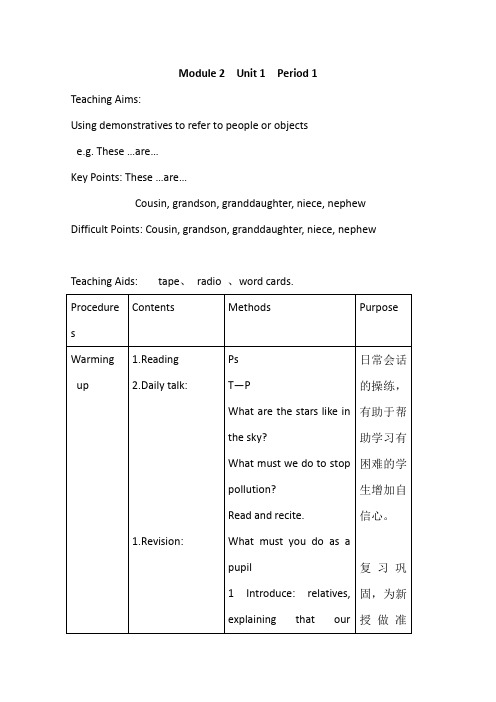
2 Draw a simplified version of your family tree on the board. As you are drawing, remind students that a family tree shows your relatives. It shows how they are related to each other and to you.
Difficult Points: Cousin, grandson, granddaughter, niece, nephew
Teaching Aids:tape、radio、word cards.
Procedures
Contents
Methods
Purpose
Warming
up
Pre-task preparation
日常会话的操练,有助于帮助学习有困难的学生增加自信心。
复习巩固,为新授做准备。
先教授单词,同时带出难词难句。
While-task procedure
Post-task activities
Assignment
relationship of family members
2. Look and learn.
通过图示让学生清楚明白nephew,niece,cousin,grandson,granddaughter等生词的确切含义。
(沪教版)牛津英语教案6BModule2Unit2(4)
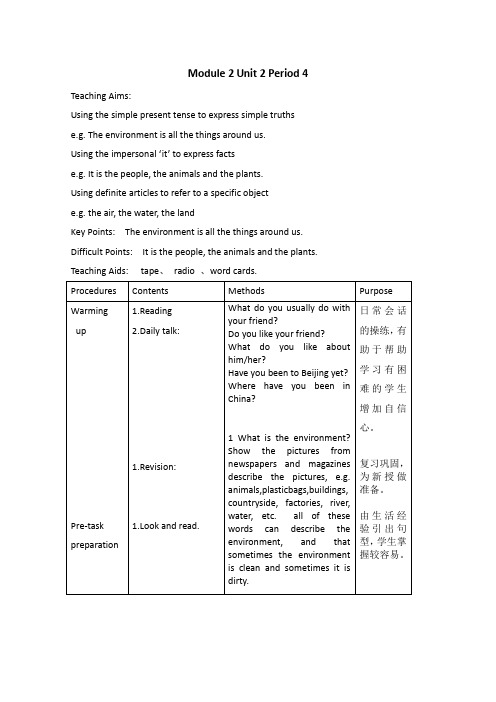
Teaching Aids:tape、radio、word cards.
Procedures
Contents
Methods
Purpose
Warming
up
Pre-task preparation
3 A clean environment is … and A dirty environment is…
4 Look and read for the first three parts.
5 The students listen and repeat.
6 talk about the photograph on the right.
e.g. It is the people, the animals and the plants.
Using definite articles to refer to a specific object
e.g. the air, the water, the land
Key Points: The environment is all the things around us.
Module 2 Unit 2 Period 4
Teaching Aims:
Using the simple present tense to express simple truths
e.g. The environment is all the things around us.
Using the impersonal ‘it’ to express facts
上海牛津6Bunit2
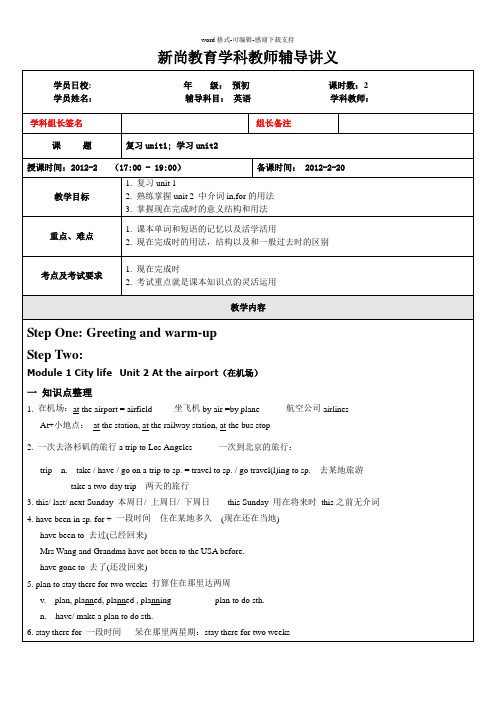
It takes sb.+时间+to do sth.
take表花费必须是it作形式主语开头,什么什么,后面只能加时间的词语,指用掉的时间。
It took them three years to build this road.
新尚教育学科教师辅导讲义
学员日校:年级:预初课时数:2
学员姓名:辅导科目:英语学科教师:
学科组长签名
组长备注
课 题
复习unit1;学习unit2
授课时间:2012-2(17:00 - 19:00)
备课时间:2012-2-20
教学目标
1.复习unit 1
2.熟练掌握unit 2中介词in,for的用法
buy sb. plenty of T-shirts and several silk scarves给某人买了许多体裇衫和几条丝围巾
=buy plenty of T-shirts and several silk scarvesforsb.
一条真丝围巾a silk scarfscarf-------scarves复数
buy (bought) sb. sth. = buy sth.forsb.
a plane ticket一张机票
{buy, make , get, cook, sing} sb. sth. ={buy, make , get, cook, sing} sth.forsb.
{take, bring, pass, lend, sell} sb. sth. = {take, bring, pass, lend, sell} sth.tosb.
23.before在。。。之前表示时间后面接句子或单词before class上课之前
- 1、下载文档前请自行甄别文档内容的完整性,平台不提供额外的编辑、内容补充、找答案等附加服务。
- 2、"仅部分预览"的文档,不可在线预览部分如存在完整性等问题,可反馈申请退款(可完整预览的文档不适用该条件!)。
- 3、如文档侵犯您的权益,请联系客服反馈,我们会尽快为您处理(人工客服工作时间:9:00-18:30)。
Unit 2 At the airport
II. Choose the best answer (选择最恰当的答案): (共15分)
( ) 1. New York is one of the biggest cities in _______ U.S.A.
A. a
B. an
C. the
D. /
( ) 2. Please help _______ with my heavy bags, Danny.
A. us
B. me
C. you
D. them
( ) 3. The Zhangs have done a lot of things but not _______.
A. everything
B. something
C. anything
D. nothing
( ) 4. The ship will leave _______ Guangzhou _______ 7 o’clock this evening.
A. /, in
B. at, in
C. to, at
D. for, at
( ) 5. Have you got _________ in your suitcase?
A. enough space
B. space enough
C. spaces enough
D. enough spaces
( ) 6. I’ve never _______ to other countries before.
A. gone
B. left
C. been
D. visited
( ) 7. I’m going to see my cousins off at the airport _______ Friday afternoon.
A. in
B. on
C. at
D. by
( ) 8. –Where is Jenny?
–She _______ the library.
A. has been to
B. has gone to
C. went
D. goes
( ) 9. Have you _______ Aunt Kite’s telephone number yet?
A. write
B. write down
C. written
D. written down ( ) 10. Paul is badly ill now, so he _______ stay in hospital for several days.
A. needs
B. has to
C. can
D. have
( ) 11. Ben _______ stay in Beijing for one year.
A. plan
B. planning to
C. plans
D. plans to
( ) 12. I can’t find my English book. Someone has _______ it away by mistake.
A. left
B. taken
C. gone
D. bought
( ) 13. I bought some stamps _______ him. So he gave some money _______ me.
A. to, to
B. to, for
C. for, to
D. for, for
( ) 14. She would like to buy several T- shirts. The underlined means _______.
A. a few
B. a little
C. many
D. much
( ) 15. –Let me drive you to the supermarket.
–_______
A. You’re welcome.
B. Never mind.
C. You are great.
D. Thank you.
III. Complete the sentences with the given words in their proper forms(用括号中所给单词的适当形式完成下列句子): (共7分)
1. Please get to the airport two hours before the_______ time. (depart)
2. Mrs. Li is going to get her _______ card. (board)
3. _______ are not allowed to smoke on the plane. (pass)
4. They got two _______ and went into the supermarket. (trolley)
5. You attention, please. The train from Hangzhou has just ________. (arrival)
6. The ________ Number is CA929. (fly)
7. Don’t worry. Let me ________ you to the cinema. (driver )
IV. Rewrite the following sentences as required(根据所给要求,改写下列句子。
每空格限填一词): (共12分)
1. We have just packed our suitcases. (改为否定句)
We _______ packed your suitcases _______.
2. Tom would like to eat sushi? (一般疑问句)
__________ Tom _________ to eat sushi?
3. The train will arrive at eleven thirty. (对划线部分提问)
_______ _______ will the train arrive?
4. My cousins have lived in Washington for 10 years. (对划线部分提问)
_______ _______have your cousins lived in Washington?
5. Mrs. Wang has brought us some silk scarves. (保持原句意思不变)
Mrs. Wang has brought some silk scarves _______ _______.
6.I’m going to Hainan Island by plane this afternoon. (保持原句意思不变)
I’m _______ _______Hainan Island by plane this afternoon.。
